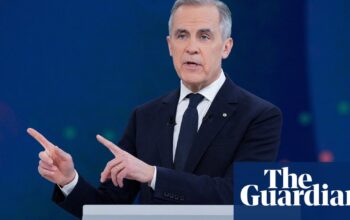
The recent success of Javier Milei in the Argentine presidential election indicates that voters in the second largest country in South America have chosen to embrace drastic measures in order to address the serious economic struggles within their nation.
It is not difficult to understand why 56% of voters supported the right-wing libertarian candidate. While Argentina boasts a top-performing football team, its economy has been in a state of crisis in recent years. The country is currently experiencing an inflation rate of 140% and a three-year drought has resulted in a significant decrease in agricultural output. Additionally, 40% of the population lives in poverty and the currency has depreciated by 90% over the span of four years.
Milei proposes replacing the peso with the US dollar as the currency for Argentina. A similar approach was implemented in the 1990s, following a period of economic downturn and high inflation. The government in Buenos Aires set a fixed exchange rate of one peso to one dollar, known as convertibility. However, this policy was abandoned in 2002 due to a severe recession and widespread protests against limitations on bank withdrawals.
The president-elect of Argentina has expressed his desire to take more drastic measures. According to his plan, the central bank of the country would essentially be eliminated and the economy would be completely “dollarized”. This would result in Argentina’s monetary policy being determined in Washington instead of Buenos Aires.
Panama and Ecuador have followed this path, but none as significant as Argentina, a member of the G20 group consisting of prominent developed and developing countries.
Milei’s economic experiment has some evident issues. Firstly, Argentina and the US have distinct economies, meaning that the monetary policy that works for one may not work for the other. Countries must be cautious when relinquishing their ability to determine interest rates and currency devaluation.
The second issue is more practical: where would Argentina obtain its dollars? Currently, the central bank has minimal reserves of US dollars and does not have access to international capital markets to acquire the necessary funds to sustain the economy. In theory, Milei could request a loan from the International Monetary Fund, but the likelihood of approval is slim. Argentina is already the largest borrower from the IMF and has a debt of $44 billion.
The International Monetary Fund has reservations about the possibility of dollarization being achievable in the near future. Before implementing dollarization, the peso would need to undergo a significant devaluation, which would result in higher prices and inflation.
Furthermore, even if a resolution is discovered for the technical obstacles involved in renouncing the peso, Milei’s sudden approach could backfire rapidly. Adopting the dollar as the national currency is a risky decision with no possibility of reversal, and it runs the risk of trapping Argentina in an unsustainable trajectory and causing a catastrophic economic downfall.
Mark Weisbrot, the co-director of a thinktank called the Center for Economic and Policy Research in Washington, stated that Argentina is facing significant consequences due to the errors made by the previous administration under Mauricio Macri in the year following 2015.
Avoid the newsletter advertisement.
after newsletter promotion
“Adopting a deranged, self-destructive strategy would only exacerbate the situation – and as shown by Argentina’s experience, things can escalate significantly,” Weisbrot stated.
Milei’s acceptance speech did not mention the implementation of the dollar as the official currency or the elimination of the central bank, causing speculation that he may backtrack on his extreme proposals. Along with changing the currency system, these plans also involve significant reductions in welfare benefits and the closure of over twelve government departments.
Nicolás Saldías, a senior Latin American analyst at the Economist Intelligence Unit, a research and analysis division of the Economist Group, said many of Milei’s proposed reforms would be unpopular, especially with low-income Argentinians, and were likely to trigger social unrest by the country’s powerful labour unions and social movements. “As a result, politics is likely to be highly polarised and divisive in the coming months, which is likely to result in a short honeymoon period for Milei.”
Source: theguardian.com


